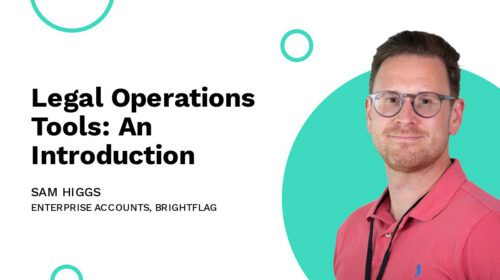A Guide to Legal Workflow Automation
According to the most recent Association of Corporate Counsel CLO survey, many legal teams are navigating challenges related to work capacity. Legal leaders reported feeling that their departments were understaffed, yet only 30% of in-house teams planned to hire new talent.
What can we take away from those trends? As we enter the era of increasingly sophisticated legal workflow automation, proactive organizations are identifying new opportunities to automate manual work. In fact, nearly half plan to implement new legal tech — and offload day-to-day, rote tasks so their team can focus on high-value work.
Using legal tech, savvy in-house departments are becoming more efficient streamlining legal workflow management, and improving their approach to strategic decision-making. The result is a simplified legal spend management landscape, along with growing opportunities for cost savings and more effective budget management.
What Is Legal Workflow Automation?
In a nutshell, legal workflow automation is the process of using technology to handle tasks and processes that the legal department previously managed manually. It takes time-consuming tasks off of the legal team’s plate, freeing them up to focus on higher-impact work.
Legal workflow automation can be applied to legal tasks like:
- Invoice review
- Data entry
- Document filing
- Contract management
A sound legal workflow management system increases the overall efficiency and accuracy of legal operations. Importantly, it also significantly reduces the time and effort legal professionals have to spend on administrative legal work. That’s great for retention and for improving the value the legal team brings to the rest of the business.
Which Legal Workflows Can You Automate for Better Efficiency?
Most structured, repetitive tasks are prime candidates for legal workflow automation, but the following nine tasks are the most commonly automated:
Invoice Review and Approval
Legal invoice review software like Brightflag utilizes AI to automatically approve invoices that meet specific parameters or thresholds set by your team (for example, invoices under $5,000 that do not contain any breaches of outside counsel guidelines).
Invoice review tools can also be set up to reject non-compliant invoices and flag line items that don’t align with outside counsel guidelines. This ensures that only approved expenses are paid. Once an invoice is approved (either through human review or pre-set AI workflows), legal workflow automation seamlessly routes that invoice to the accounts payable department.
Accruals Collection and Reporting
Legal automation software can also be used to prompt vendors to submit their unbilled estimates, or legal accruals, directly. This reduces back-and-forth communication with law firms, increasing efficiency. It also keeps teams on top of accruals and supports them in maintaining accurate financial forecasting and reporting.
Spend Reporting
Spend reporting is another area where the right software can drastically improve legal operations. Top legal workflow tools enable teams to visualize legal spend with the click of a button, simplifying a task that would previously have required weeks of intensive data collation. Automation software can also track key performance indicators (KPIs), generate detailed reports on specific matters or practice areas, identify emerging trends and insights, and automate the process of disseminating reports to other stakeholders within the company.
Budget Tracking
Budget tracking is another challenge that can consume a significant amount of the in-house team’s time if done manually. The best legal workflow automation software can integrate with finance tools to automatically report on legal budget tracking, and share alerts if spending exceeds the allocated budget.
This proactive approach to budget management helps maintain financial discipline and ensures effective communication with the finance department regarding budget status and projections.
Timekeeper Rate Approvals
Doing the necessary research to negotiate timekeeper rate requests from a position of strength can be time-consuming. It oftentimes requires meticulous data analysis, and involves benchmarking rates across firms and poring over industry data to determine what constitutes a fair rate.
Having legal vendors submit their timekeeper rates requests directly through a centralized platform, such as Brightflag, helps reduce much of the work. From benchmarking requested rate increases against historical trends, to comparing rates across firms, it makes it much easier to ensure your legal department is paying a fair price for outside counsel legal services.
Legal Intake
Client intake processes become significantly more efficient with the aid of legal workflow management tools. Many include a centralized onboarding portal for incoming legal requests, where users input all relevant information about their matter. The system then automatically routes these requests to the appropriate in-house staff member and notifies them. This ensures quick and organized responses to legal inquiries with reduced workload for your team, while also improving service delivery to the rest of the business.
Document Generation
Workflow automation tools can also be used to speed up one of the most time-consuming aspects of the legal workday: document generation. For instance, automatically generating a contract template and then populating it with relevant client information. As AI becomes more prevalent, these capabilities extend even further, with many platforms incorporating features such as clause libraries and automatic recommendations for fallback clauses or guidance on rectifying unclear contract terms.
These capabilities reduce manual workloads, minimize errors, and expedite the document management and contract lifecycle management processes.
Scheduling and Deadlines
Many systems come with capabilities for tracking critical deadlines and sending out automatic reminders to all relevant parties. This ensures legal matters proceed without a hitch and that teams stay on schedule, meet compliance requirements, and avoid the all-too-prevalent last-minute scramble to wrap up pressing tasks and issues.
Matter Updates and Advanced Matter Management
The final area where automation can make a massive difference for in-house legal teams is matter management. Using tools like Brightflag’s Advanced Matter Management, teams can automate reminders about tasks and updates, ensuring everyone stays up-to-date on the progress of matters.
The best tools also highlight everything pertinent regarding matter status in a single dashboard view. This means in-house team members can get an instant overview of the current state of any matters they’re working on, along with upcoming requirements, legal spend, and budget tracking.
How Legal Workflow Automation Improves Operational and Financial Outcomes
From the above, it’s clear that legal workflow automation offers significant advantages in terms of managing everyday tasks more efficiently. No surprise, then, that around 75% of surveyed legal departments say that developing or refining their team’s tech strategy is a top priority. Here are 4 of the ways smart legal technology implementation is helping in-house teams come out ahead:
Reducing Repetitive Work
The most significant benefit of legal process automation is the considerable amount of time it saves. Legal professionals who previously dedicated hours each week to meticulously examining invoices, for example, can now use this time for more strategic and high-value legal tasks.
In a business context, that translates into tangible gains. Firstly, it improves the team’s overall productivity and effectiveness without the need for additional headcount. But perhaps more importantly, it allows your legal team to focus on how their outputs align with business objectives, which can help turn the legal department into a strategic partner rather than simply a cost center.
Avoiding Paying for Non-Compliant Work
Because legal workflow tools like automated invoice review employ predefined rules to identify and flag discrepancies automatically, they can help your team quickly identify billing errors and non-compliant billing entries.
This significantly minimizes the risk of non-compliant charges and fosters an environment of transparency and accountability with your legal service providers. It also makes it easier for your department to adhere to the budget, because overpayments are prevented.
Cost Savings Insights and Budget Reporting
Above and beyond billing compliance insights, legal workflow automation software can also offer significant benefits for budget tracking and reporting, primarily if your team utilizes a comprehensive, all-in-one platform. By consolidating spend data in one system, you can easily view details such as spend by practice area or vendor, as well as spend-to-budget on specific matters.
Using those capabilities, in-house counsel can generate reports that measure spend by matter, vendor performance, and compliance with billing guidelines. This allows for a detailed analysis of where your budget is going.
These reports can also help your team unearth insights critical for vendor negotiations — such as which outside firms assign routine matters to senior rather than junior legal staff, comparative resourcing rates, and areas where spend can be consolidated under a single provider to encourage bulk-work discounts.
Streamlined Approvals & AP
The final area where a legal workflow management system optimizes performance is in terms of invoice approval and ensuring your outside counsel firms get paid on time (or faster).
For example, automated invoice approval workflows can route legal bills to the correct approver every time. The responsible attorney then receives a notification and can review, approve, reject, or adjust the invoice without the back-and-forth that often comes with manual workflows. Other benefits include:
- Invoices land on the right desk every time
- Your team isn’t left manually searching for missing invoices
- Approved invoices are automatically and immediately sent to finance for payment
How Brightflag Enables Legal Workflow Automation
Interested in learning more about how a legal workflow automation solution can improve your team’s efficiency? Brightflag’s intuitive e-billing and matter management software is designed to make getting started as easy as possible.
And not just for invoice review. Brightflag is an enterprise legal management solution that handles:
- Vendor billing
- Accruals and financial close
- Budgeting and financial planning
- Vendor benchmarking
And much more.
Ready to see it in action? Book a personalized demo today.
FAQS
How Does Legal Workflow Automation Save Time for In-House Teams?
Using legal workflow software frees your team from tedious and repetitive admin tasks. It also ensures that tasks are escalated through the proper channels as needed and that approvals reach the right desks, which means less time spent following up on the status of tasks or legal matters.
Can Workflow Automation Reduce Legal Spend?
Absolutely. The best legal workflow tools are designed to provide teams with detailed insight into their spend and budget, enabling them to identify opportunities to reduce costs. The efficiency gains from these tools also mean that teams can often handle growing workloads without needing to increase headcount.
What Features Should a Legal Workflow Automation System Include?
There are several key factors to consider when selecting an ideal legal workflow management system. However, your top priorities should include invoice review, reporting features, spend and budget management, alerts and approvals, document management capabilities, and advanced matter management tools.
Is Workflow Automation Difficult to Implement for a Legal Department?
It depends on the provider. While most legal workflow automation tools are built with ease of implementation in mind, some solutions are still easier to add to your tech stack than others. Look for a solution that includes integrations, strong customer support (including onboarding), and evidence of ongoing commitment to innovation and expanding the toolset available to your team.



